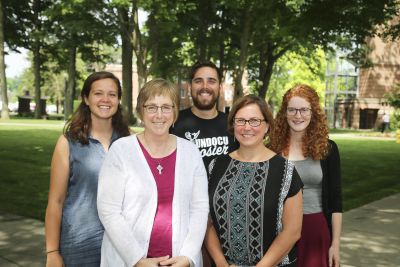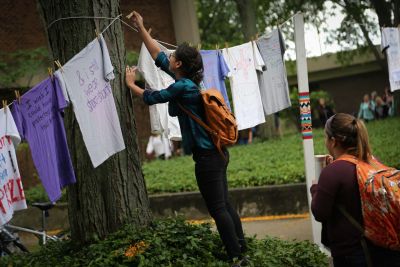Student researchers help improve campus sexual assault prevention and response programs
See also:
Beth Martin Birky: Sudden change happens slowly — The Record
GC works toward awareness — The Record

Three Goshen College students spent this past summer researching and developing new resources for the college’s sexual violence prevention and response programs. Seniors Laura Miller, from Akron, Pennsylvania, Zach Zimmerman, from Archbold, Ohio, and Sarah Hofkamp, from Peabody, Kansas, conducted this research as a Maple Scholars project, an eight-week intensive summer research program under the supervision of faculty members.
Beth Martin Birky, professor of English and director of women’s and gender studies, and Kendra Yoder, associate professor of social work, met with the students three times a week to provide feedback and assistance with their research.
Their research was prompted by Launa Leftwich, dean of students, and funded through the Maple Scholars program, the student life office, the American Association of University Women local chapter and select academic departments. It focused on the college’s compliance with Title IX, a law that protects students from sex-based discrimination in education, in part by requiring any school receiving federal funds to take explicit measures toward preventing and responding to sexual assault.
The college’s bystander training program is called the Prevention Intervention Network (PIN). Bystander education, which the researchers noted has been proven in studies to be the most effective way to combat sexual assault, bullying and other types of personal violence, works to train students to step in when they see potentially harmful situations.
“I really appreciate that the training for PIN is not just limited to sexual misconduct, but it can also be applied in different settings such as racial discrimination and racism,” Leftwich said in an interview with The Record. “It helps us create a culture that respects individuals for who they are.”
Miller elaborated, “PIN offers this community a unique opportunity to come together to intentionally shape our culture to stop sexual violence and support survivors.”

In the last year, PIN’s student leaders worked with the college to make bystander training mandatory for all first-year students and student leaders, as well as to make training available to off-campus houses, clubs and sports teams. Through 2,000 cumulative volunteer hours, student PIN members have trained more than one-third of the college’s student body.
Pre- and post-tests administered to Goshen College students who received bystander training show a marked increase both in knowledge and willingness to intervene in situations that could prove harmful.
PIN also plans to provide trainings at several area churches and possibly help other colleges to develop their own bystander education resources.
Along with their research, Miller, Zimmerman and Hofkamp helped developed new materials and curriculum for the college, including scripts for people leading training sessions; educational materials for Study-Service Term (SST), the college’s study abroad program; an online sexual assault reporting mechanism; and grant applications to secure funding for PIN.
According to Miller, the online report form is created to be a survivor-based resource. “One of the best parts about the form is that it will hopefully give survivors more autonomy and control over reporting the incident,” she said. “It both minimizes the number of parties who know about the report and reduces the chance that reports go unaddressed.”
“I think the reporting tool and resources for SST students and leaders will have the biggest impact on the campus because it pushed our thinking about the ways we can be supportive of students in all facets of their GC education,” said Birky.
Looking forward, Birky said that she hopes to develop a more interconnected approach of responding to sexual violence. “We need to do more to understand diverse experiences of everyone in our community and provide resources that are appropriate,” she said. She is also looking toward increasing resources and education for college employees as well as students.
Yoder said that nearly two dozen GC student PIN educators participated in a week-long education and training session before classes started in August.
“The surge of new group members represents the broad interest and investment of students in these issues on campus,” she said. “The group is also more representative of student demographics, with a third of the students identifying as students of color and over a fourth identifying as men. Without the support of the Maple Scholar team, it would have been extremely difficult to prepare to train and support such an accomplished and large group of PIN educators.”
Miller said, “We’re sending a message to everyone in this community that we will not ignore or discount people’s experiences of sexual violence, but rather work hard to stop it and give survivors the support they need.”
— By Grace Weaver ’16




